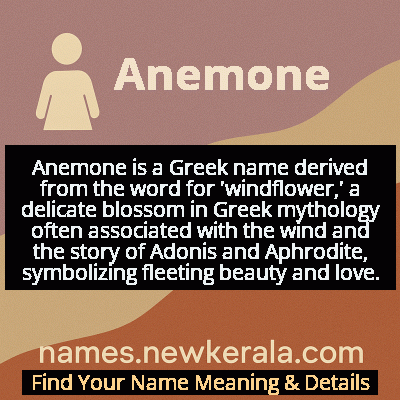Anemone Name Meaning & Details
Origin, Popularity, Numerology Analysis & Name Meaning of Anemone
Discover the origin, meaning, and cultural significance of the name ANEMONE. Delve into its historical roots and explore the lasting impact it has had on communities and traditions.
Name
Anemone
Gender
Female
Origin
Greek
Lucky Number
4
Meaning of the Name - Anemone
Anemone is a Greek name derived from the word for 'windflower,' a delicate blossom in Greek mythology often associated with the wind and the story of Adonis and Aphrodite, symbolizing fleeting beauty and love.
Anemone - Complete Numerology Analysis
Your Numerology Number
Based on Pythagorean Numerology System
Ruling Planet
Uranus (Rahu)
Positive Nature
Strong sense of order, loyal, practical, and disciplined.
Negative Traits
Stubborn, overly serious, rigid, and prone to feeling restricted.
Lucky Colours
Blue, gray.
Lucky Days
Saturday.
Lucky Stones
Blue sapphire.
Harmony Numbers
1, 7, 8.
Best Suited Professions
Managers, engineers, accountants, organizers.
What People Like About You
Dependability, discipline, practicality.
Famous People Named Anemone
Anemone (Anne Bourguignon)
Actress
French actress known for her roles in French New Wave cinema, winner of César Award for Best Actress
Anemone van Oranje-Nassau van Amsberg
Royalty
Member of Dutch royal family, granddaughter of Princess Margriet of the Netherlands
Anemone del Carmen
Environmental Scientist
Marine biologist known for coral reef conservation research in the Caribbean
Name Variations & International Equivalents
Click on blue names to explore their detailed meanings. Gray names with will be available soon.
Cultural & Historical Significance
Beyond its mythological origins, Anemone has maintained cultural relevance through its botanical associations. In Victorian England, when floriography (the language of flowers) became popular, anemones symbolized anticipation and fading hope. Different cultures have attributed various meanings to the flower - in Chinese tradition, it represents death and bad luck, while in Egyptian culture, it was associated with illness. However, in modern Western contexts, the anemone flower has taken on more positive connotations of protection and anticipation. The name's enduring appeal lies in this rich tapestry of meanings, connecting classical mythology with natural beauty and emotional depth across centuries of cultural evolution.
Extended Personality Analysis
Individuals bearing the name Anemone are often characterized by a unique blend of creativity, sensitivity, and resilience that reflects their mythological and botanical origins. They typically possess a deep appreciation for beauty and art, with many showing talent in creative fields such as writing, painting, or music. Their connection to the wind in the name's etymology suggests a personality that values freedom and independence, often making them innovative thinkers who challenge conventional wisdom. Anemones are frequently described as highly intuitive and empathetic, with an almost psychic ability to understand emotional undercurrents in relationships and social situations.
Despite their sensitive nature, those named Anemone often demonstrate remarkable resilience, much like the flower that can bloom in challenging environments. They tend to be adaptable to change and capable of weathering emotional storms while maintaining their core identity. This combination of sensitivity and strength makes them valuable friends and partners who offer both emotional support and practical wisdom. Their mythological background suggests a capacity for transformation and renewal, often emerging stronger from difficult experiences. While they may appear reserved to strangers, they form deep, lasting bonds with those who appreciate their complex nature and artistic sensibilities. Many Anemones feel a strong connection to nature and environmental causes, reflecting the ecological symbolism of their namesake flower.
Modern Usage & Popularity
In contemporary naming practices, Anemone occupies a unique position as a rare but increasingly appreciated choice that bridges classical mythology with modern environmental consciousness. While the name has never achieved mainstream popularity, it has experienced a gradual resurgence since the early 2000s, particularly among parents seeking distinctive names with deep cultural roots. Current usage trends show it appearing more frequently in artistic, academic, and environmentally-conscious communities where unique mythological and botanical names are valued. The name's complexity and unusual sound make it a bold choice that appeals to parents wanting to avoid common names while maintaining elegance and historical significance. In countries like France and Italy, where classical names maintain stronger cultural presence, Anemone sees slightly higher usage, though it remains uncommon overall. Modern parents often choose the name for its beautiful sound, rich mythology, and connection to nature, positioning it as a sophisticated alternative to more common floral names. The name's rarity ensures it stands out while its classical origins provide a sense of timeless beauty and cultural depth.
Symbolic & Spiritual Meanings
The name Anemone carries profound symbolic meanings that span mythological, botanical, and emotional dimensions. Most prominently, it symbolizes the cycle of life, death, and rebirth through its origin story involving Adonis's death and transformation into the anemone flower. This connects the name to themes of eternal love, sacrifice, and spiritual renewal. The wind element in its etymology ('anemos') adds symbolism of freedom, change, and invisible forces that shape destiny. In floriography, anemones represent anticipation and expectation, while their ability to close at night and reopen at dawn symbolizes protection and renewal. Different colored anemones carry specific symbolic weight: red represents forsaken love or death, white signifies sincerity and innocence, purple denotes protection from evil, and blue symbolizes trust and anticipation. Modern interpretations often emphasize the flower's resilience in difficult conditions, making Anemone a symbol of perseverance and the ability to thrive despite adversity. Environmental symbolism has become increasingly relevant, connecting the name to ecological awareness and the delicate balance of natural systems. The name ultimately embodies a beautiful paradox - representing both the fragility of life and the enduring power of love and transformation across mythological and natural realms.

